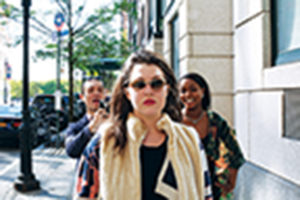by Maddie Lee
Waterloo alumni and siblings Elizabeth and David Lam have been working with a team for the past three years to produce and release the feature length film, Viral Beauty.
The film touches on issues of cyberbullying, body image, diversity, and the effects fame has on both creators and consumers. These topics were conveyed using a fictional plot of an apparently average individual, Marsha Day, through her day-to-day activities as she goes from barista to virtual celebrity over the course of a few months.
To fully demonstrate the highs and lows of Marsha’s journey, a variety of visual techniques were used by the producers including mock blog pages, YouTube video snippets, phone camera roll videos, and traditional acting scenes.
At its roots the film can be described as heightened realism, however, the producers made sure to incorporate real YouTubers as actors who played themselves in this fictional world. The YouTubers gave commentary on Marsha’s online presence, which gave an authenticity to the film, as audience members may be familiar with the influencers featured, who were, for the most part, behaving as they would on their typical platform.
The writer of the film, Elizabeth Lam, was able to provide further insight into the production process of Viral Beauty. Elizabeth graduated from University of Waterloo with a Bachelor of Computer Science and director David Lam from NYU after studying acting. Elizabeth expressed that she had always had an interest in both tech and the arts. She had written various short film scripts to develop her skills before taking on the project of a full-length feature film.
Originating from one of Elizabeth’s short films, Viral Beauty got its start when the two siblings were together for the holidays in 2015. With their combined skill set, the duo was able to move forward with the project and continued to flesh out the script and production logistics through the greater part of 2015.
Despite numerous drafts of the script, the plot of a struggling protagonist looking for love online stayed consistent. This topic was chosen based on Elizabeth’s history as a consumer of digital media and her exposure to the dangers of online communication.
To further develop the nuances of the film, the production team did extensive research into the lives of digital influencers. This included reaching out directly to notable online celebrities, including Perez Hilton, an American video blogger with an estimated net worth of over $45 million.
Elizabeth conveyed that bringing in both influencers and traditional actors created a large cast and crew, and dealing with this number of individuals proved to be the most difficult part of the production process. The style of simulating a virtual environment, which the film took on, meant the editing process was extensive. Each actor had various opinion segments which had to be cut and edited cohesively.
Another stylistic aspect of the film is the over-exaggeration of reactions by actors to various events in the film. The characters demonstrated immense feelings of joy, sadness, and anger. Elizabeth stated that this approach was taken to develop a sense of heightened realism in the film and to effectively convey the various themes in the script. These themes were chosen specifically to aid in conveying a cautionary tale with which many consumers are familiar. Having a virtual presence makes one susceptible to security and privacy threats. The negative events that transpire through the film depict the severity of some of these threats.
Elizabeth hopes that Viral Beauty can continue to gain traction from the media so that these messages can reach a wider audience. She expressed that the film can appeal to many different audiences as it has many levels of complexity, specifically surrounding diversity of age, gender, sexuality, and opinions.
Information on Viral Beauty can be found on Amazon, Goole Play, YouTube, and http://www.viralbeautymovie.com/
































